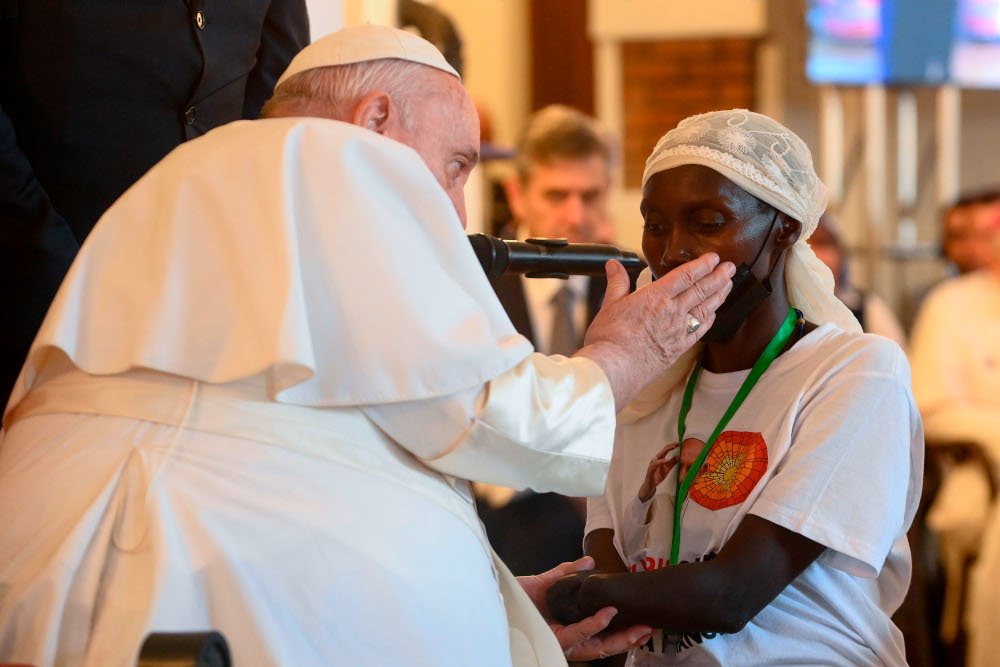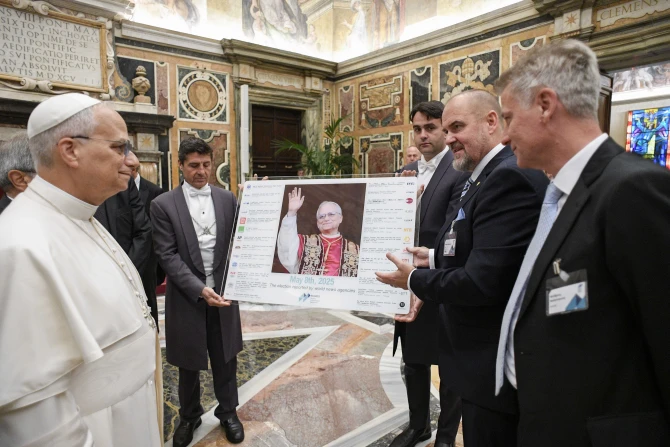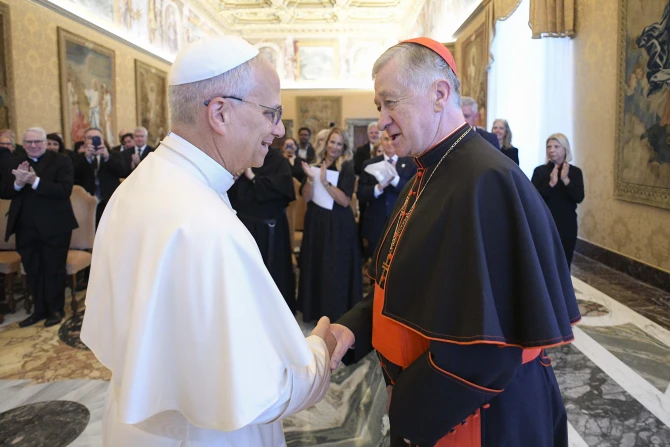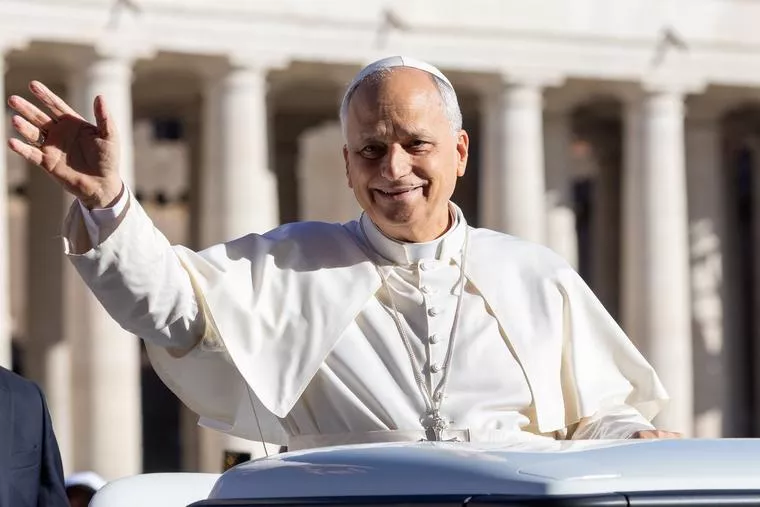Enough. Enough enriching themselves on the skin of the weakest, enough enriching themselves with resources and blood money.” Meeting with the victims of the conflict raging in the East of the country, Pope Francis spares no harsh words against “all the entities, internal and external, that pull the strings of the war in the Democratic Republic of Congo, plundering, scourging and destabilizing it,” who enrich themselves “through the illegal exploitation of this country’s assets and the bloody sacrifice of innocent victims.” And he asks them to listen to “the cry of their blood,” lending “an ear to the voice of God, who calls you to conversion, and to that of your conscience: silence the weapons, put an end to the war.”
It is a call that goes hand in hand with necessary reconciliation. Arriving in Kinshasa, Pope Francis immediately said that the nation’s future was in the people’s hands. And the people must go through a necessary reconciliation, going beyond ethnic hatred, rediscovering in the neighbor the brother, and overcoming the sense of revenge. An issue that is crucial in the East of the country, where up to 60 armed gangs have been counted, but where there are mainly two that matter, M23, and the FDA. The former, which has come almost to demarcate an invisible border with the Congolese state, passes through Goma, precisely where Italian Ambassador Luca Attanasio was killed and where the Pope would have liked to celebrate Mass—the second, coming increasingly into contact with ISIS.
If the Pope cannot go to Goma, then it is Goma to go to the Pope, and the testimonies of Ladslas, Bijoux, and Emelda, who will make an act of commitment to forgive, but for now, they only tell of the violence they experienced.
These are hard-hitting stories, from the 9-year-old kidnapped boy who forgives his executioners to the girl just 17 years old who remained 19 months in the hands of armed groups, raped, became pregnant, and now the mother of twins who “will never know their father,” who managed to escape fortunately, from the woman who was kidnapped at 15, reduced to a sex slave for three months, fed human flesh with animal flesh that one could not refuse to eat on pain of being torn to pieces, to the young man who recounts the drama of destruction and looting in his village. There are some mutilated women. All carry a sign, place it under the cross, and all ask and give forgiveness, with a pledge read together in a touching moment. The Church is the place of consolation for them because Caritas and parishes provide them with relief and help.
The Pope mentions the places of the tragedies – Bunia, Beni-Butembo, Goma, Masisi, Rutshuru, Bukavu, Uvira – he points out that the international media “hardly ever mention them,” yet that is where those take people hostage, with the most potent weapons.
Pope Francis addresses the people of the East, says he is close to them, and “your tears are my tears, your pain is my pain.” And again, the Pope adds, “God loves you and has not forgotten you, but let men also remember you!”
In the name of God, the Pope condemns “the armed violence, massacres, rapes, destruction and occupation of villages, the plundering of fields and livestock that continue to be perpetrated in the Democratic Republic of Congo.”
But the Pope also points his finger at the “bloody, illegal exploitation of the wealth of this country, as well as attempts to fragment it to manage it,” as it “fills one with outrage to know that the insecurity, violence, and war that tragically affect so many people are shamefully fueled not only by external forces but also from within, to gain interests and advantages.”
Pope Francis asks God for “forgiveness for man’s violence on man” and to console “the victims and those who suffer, converting the skins of “those who commit cruel atrocities, which cast infamy on all humanity,” and opening “the eyes of those who close them or turn away before these abominations.”
Pope Francis notes that these conflicts “force millions of people to leave their homes, cause severe human rights violations, disintegrate the socio-economic fabric, and cause wounds that are difficult to heal.”
The Pope does not delve into the complex Congolese situation. He stresses that these are “partisan struggles in which ethnic, territorial and group dynamics are intertwined” or “conflicts that have to do with land ownership, the absence or weakness of institutions, hatreds in which the blasphemy of violence in the name of a false god infiltrates.”
For Pope Francis, however, it is a “war unleashed by an insatiable greed for raw materials and money, which feeds an armed economy, which demands instability and corruption. What a scandal and hypocrisy: people are being raped and killed while businesses that cause violence and death continue to thrive!”
The Pope proposes two no’s and two yeses to the people exhausted by violence. First of all, the “no” to violence, without ifs and buts, because “loving one’s people does not mean nurturing hatred towards others,” but rather “refusing to allow oneself to be drawn in by those who incite the use of force.”
“Hatred and violence,” Pope Francis concluded, “are never acceptable, never justifiable, never tolerable, and all the more so for those who are Christians. Hatred generates more hatred and violence more violence.”
And “no” must be said to those who propagate hatred and violence in the name of God because “God is God of peace and not of war.”
“To preach hatred,” the Pope added, “is blasphemy, and hatred always corrupts man’s heart. Those who live by violence never live well: they think they are saving their lives and instead are swallowed up in a whirlpool of evil that leads them to fight the brothers and sisters with whom they grew up and lived for years and kills them inside.”
To do so, it is not enough to avoid violent acts. One must rather “uproot the roots of violence,” such as “greed, envy, and resentment,” with the courage to “disarm the heart” as today’s witnesses did, which does not mean “ceasing to be indignant in the face of evil and not denouncing it,” nor does it “mean impunity and condoning atrocities, going on as if nothing had happened.”
One must, instead, “demilitarize the heart,” meaning “remove poison, reject rancor, defuse greed, erase resentment,” an act that “seems to make one weak, but makes one free, because it gives peace.”
Then, the Pope calls for a “no to resignation” because “peace calls for combating the discouragement, discouragement, and distrust that leads to the belief that it is better to distrust everyone, to live apart and distant rather than to reach out and walk together.”
The Pope renews his invitation to all in the Democratic Republic of Congo to commit themselves to “building a better future” because “a future of peace will not rain from the sky, but it can come if resigned fatalism and fear of getting involved with others are cleared from hearts.”
“All with someone” and not “all against someone,” in a world in which “the other, whether Tutsi or Hutu, will no longer be an adversary or an enemy, but a brother and sister in whose heart it is necessary to believe that there is, albeit hidden, the same desire for peace. Even in the East, peace is possible! Let us believe it! And let us work at it without delegating change!”
The Pope warns that “one cannot build the future by remaining closed in one’s particular interests, folded into one’s groups, ethnicities and clans.” He recalls the Swahili proverb “jirani ni ndugu” [neighbor is a brother], and this applies to all those who are neighbors, “whether they are Burundian, Ugandan, or Rwandan,” all brothers because they are “children of the same father,” and all called to say together “never again violence, never again resentment, never again resignation!”
So, Pope Francis calls for saying yes to reconciliation. The Pope praises the commitment to forgive one another and repudiate wars and conflicts “to resolve distances and differences,” to be done under “the tree of the cross,” which was “an instrument of pain and death” that “crossed by the love of Jesus, has become an instrument of reconciliation, a tree of life.”
To the victims who are about to commit to forgiving themselves, the Pope asks them to be “trees of life,” reminding them that “faith brings with it a new idea of justice, which is not satisfied with punishing and renounces avenging, but wants to reconcile, defuse new conflicts, extinguish rancor, forgive.”
It is a perspective that “is more powerful than evil” because it “transforms reality from within instead of defeating it from without,” since “only forgiveness opens the door to tomorrow because it opens the door to a new justice that, without forgetting, unhinges the vicious circle of revenge.”
Pope Francis emphasizes that “to be reconciled is to generate tomorrow,” which means “to believe in the future instead of remaining anchored to the past; it is to bet on peace instead of resigning oneself to war; it is to escape from the prison of one’s reasons to open oneself to others and savor freedom together.”
The decisive “yes” is to hope because “if reconciliation can be represented as a tree, hope is the water that makes it flourish.” And the source of this hope is Jesus because with Jesus, “evil no longer has the last word on life,” with Him, “new possibilities” open up, and “every grave can be transformed into a cradle, every ordeal into an Easter garden.”
Jesus gives birth to hope both “for those who have suffered evil and for those who have committed it,” and it is this hope that the Pope points to his brothers and sisters in eastern Congo, stressing, however, that this “is also a right to be won, sowing it every day with patience.”
It means working “with future generations in mind and not immediate results” because “sowing good does good” in that it “frees one from the narrow logic of personal gain and gives each day its why: it brings into life the breath of gratuitousness and makes us more like God, the patient sower who scatters hope without ever tiring.”
Pope Francis thanks the “sowers of the peace who work in the country,” recalls Ambassador Luca Attanasio, who was killed along with a Carabiniere Vittorio Iacovacci and driver Mustapha Milambo in February 2021, and then expresses closeness to the inhabitants of Ituri, North, and South Kivu, prays that women “be respected and valued,” because “to commit violence against a woman and a mother is to do it to God himself, who from a woman, from a mother, took the human condition.”
Pope Francis concludes, “Jesus, our brother, God of reconciliation who planted the tree of life of the cross in the heart of the darkness of sin and suffering, God of hope who believes in you, in your country and your future, bless you and console you; may he pour his peace into your hearts, into your families and on the entire Democratic Republic of Congo.”




